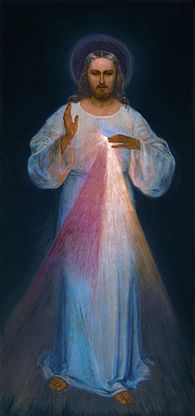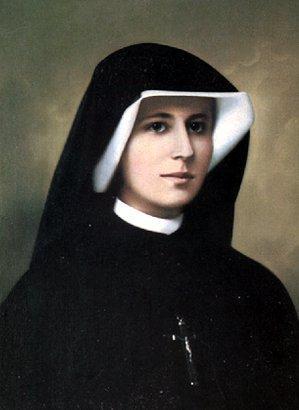Today we celebrate one of the newest of saints in the liturgical calendar, placed therein only a few years ago, with October 5th, the day she entered eternity, chosen as the memorial Saint Faustina Kowalska (1905 – 1938). She is the sister who received numerous visions of Our Lord manifested as ‘the Divine Mercy’, with the now-familiar red and white rays emanating from His Sacred Heart, a devotion to the Christ’s divine and human love, reminiscent of the divine message first given to another visionary four centuries earlier, Saint Margaret Mary Alacoque.
Helena Kowalska, as she was prior to her religious profession, first received her vocation at the age of seven, knowing she was one day to consecrate her life to God. The desire to give herself in religious life was still strong at 18, but her parents forbade her. Being poor, they needed help with her income as a housekeeper.
It was while at a dance with her sister in the city of Łódź, Christ appeared to her in a vision, wearing His crown of thorns, asking how long she was going to make Him wait; she fled from the dance, and ran to the cathedral, where Christ asked her, without taking provision for the flesh, to make true her childhood intention. In a quite literal apostolic ‘leaving everything and following Him’, Helena embarked on the next bus to Warsaw, with no luggage, wearing only the dress she had worn at the dance, and not telling anyone; a parish priest found her a room, whence she asked at various convents, all of them refusing the impoverished peasant, with no dowry. That is, until the Congregation of the Sisters of Our Lady of Mercy took, well, mercy on her, on condition that she work until she could pay for her own habit. Which she did, entering the novitiate one year later.
Although often ill – one wonders about Blaise Pascal’s dictum that sickness is the natural state of Christians – Helena found her home, taking the name in religion Faustina – the ‘fortunate one’, perhaps after the early martyr ‘Faustinus’ (+120) – and was gifted with continual visions of Christ. She found a sympathetic confessor, Father Michael Sopoćko, who, after ordering a psychiatric evaluation (which Faustina passed as perfectly normal) encouraged her to write down what Christ said to her, now her famous ‘Diary’.

Christ also asked Faustina to have an image painted, the now familiar, and near-ubiquitous one by Eugene Kazimieroswki. The face matches up almost perfectly with that of the Shroud of Turin.
After just over a decade of a hidden religious life, Sister Faustina died, likely of tuberculosis, on this day, October 5th, in 1937, predicting that there would be a terrible war, a fulfilment of the prophecy first made to the young seers at Fatima if the world did not repent. But she also saw, in the midst of all the evil, the pouring out of God’s mercy and love on souls – where sin abounds, grace abounds all the more.
Father Sopoćko spread devotion to the ‘Divine Mercy’, which spread rapidly throughout the world. There was some opposition just before the Second Vatican Council, perhaps due to an imperfect translation and a misunderstanding of some of the limits of how far God’s mercy would extend, but Pope John Paul II, always a devotee as a bishop and cardinal, took things under his own pastoral direction as Pope, and instituted the Second Sunday of Easter as ‘Divine Mercy Sunday’ in the Jubilee year 2000. He himself was to pass into eternity of the same feast five years hence, and it was also the feast on which, in 2011 and 2014 he himself would, respectively, be beatified and canonized.
Saint Faustina exhorted us all to avail ourselves of the Divine Mercy, now open wide to receive as many souls as respond to God’s grace, before it’s too late – either at the end of their lives, or the end of time and history itself. As she exhorted us, we pray the Chaplet – and, we might add, the Rosary – to obtain mercy, to trust in Christ’s mercy, and to show mercy to others. What graces await those who immerse themselves in God’s infinite mercy will only be known in eternity – and the only limits to that mercy are the ones we ourselves place upon it, or, more to the point, on Him.
Christ desires that we respond to Him with faith, along with complete trust and love. It is with these small treasures that He will give us, in return, an infinite and eternal reward in the beatitude of His own overflowing Life.
Jezu, ufam tobie. Jesus, I trust in Thee.

